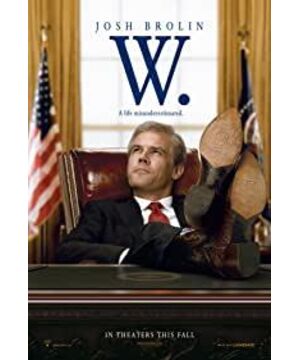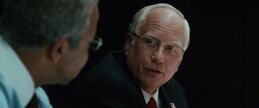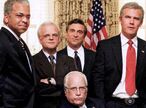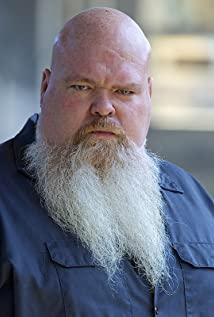And these don't seem to be what the film really focuses on revealing. This movie seems to be more willing to try and restore the mental journey of how a dude who has nothing to do with his father's negative frustration and seeks to prove himself. It is a personal story, not a history, not a biography.
So the next question is, how ambitious is this movie? Or to put it another way, who is the story of this movie to be told?
It must not be told to future generations. When watching, try to imagine that you are a person hundreds of years later. The Iraq War sounds almost as old as World War II, so will you be able to understand this movie? The answer is obviously no. This film does not seek to form a coherent and coherent system in narrative, and is unwilling to spend a lot of pen and ink to lay out the background, because it is obvious that the main creators have already thought in their hearts that the audience of this film should already know this well.
Oliver Stone is a director who always prefers political films, and even has the style of "historical director". But in this third film featuring the American president, perhaps the liver trembles, or perhaps the interest is not here. In short, he did not examine and tell from the height of history. Rather, he stands in the moment, and seems to have no intention of pretending to be objective, but instead chooses an ambiguous angle to tell the story.
As a financial reporter, it seems to me that we need to introduce George W. Bush from a historical perspective. The most important thing is two parts.
The first is its economic policy. In the first year of his tenure, he witnessed the decline after a wave of prosperity for more than a decade, and in just one year, the United States reopened another wave of prosperity that lasted for seven years. There must be many stories to tell. During his tenure, the free market has almost become a matter of course, financial innovation has reached unprecedented heights, and the trend of credit expansion is frightening. The global economic crisis of man has become the final legacy of his economic policy. But this kind of conflict is too scattered, the drama of the conflict is very low, and such a grand narrative is extremely difficult to control, Stone knows that he is not sure to give up is a wise move. Of course, the economic crisis had not yet appeared at the time of the filming, and Stone was afraid that he did not realize the far-reaching historical significance of Bush’s economic policies.
economic policy? Stone wandered this muddy water unintentionally.
In addition, there is a series of wars against terrorism. What is the purpose of these wars? What was the decision-making process back then? What was the real plan back then? How many strategic goals have been achieved now? How will these wars affect the history of the United States and the world? These questions undoubtedly constitute a sufficient reading motivation, which also contains concentrated drama conflicts. If you want to describe this president who is "historical" despite being "unpopular" in just two hours, this is undoubtedly the most reliable clue.
Stone, who is well versed in political films, naturally knows this, so he chose the war in Iraq as the main line of his narrative. But to complete the narrative of this clue and answer the questions above, Stone is still short of breath.
He realized that he could not fully discuss these questions and give a responsible answer, but he was unwilling to abandon the only clue that would not immediately declare the film's failure. So I had to bite the bullet and set up the air with this main line, and filled it with a large number of young Bush’s wandering corpses, the emotional entanglement between Bush Jr. and Bush Sr., and the whole narrative was so fragmented that it was ignored. The original motivation for viewing the movie. In the end, the nature of the film has been quite different. It has introduced Bush Jr. to all the contemporary people who already know Bush Jr.’s man in the least important content in history.
The war on terror? To touch a big fish in this muddy water, Stone was powerless. So don’t be surprised when you find that what this movie is trying to tell you is what you already know.
Bush Jr. may be regarded as the weakest US president in history. This is a well-known fact. However, there are no more articles to do about this, because letting a person as weak as Bush Jr. master the world's most powerful power is not a personal error but a problem of the system.
And if a person with mediocre intelligence like Bush Jr. can become president, it is impossible for people not to doubt the influence of his father Bush in it. However, Stone was once again short of breath in revealing how Bush Sr. played a role in Bush Jr's road to the White House, so we found an amazing flash of the election process, just a few seconds of scenes.
Now that's all right, we haven't mentioned all the things we want to know. Stone had no choice but to continue playing the bad hand of Bush's father-son relationship. The whole film became how George W. Bush lived in the shadow of Bush Sr. (of course, there are both shadows and shadows), and gradually found his own direction and path. The son is always unable to meet the expectations of his father, always in denial, and trying to prove himself to his father... Close his eyes and think about the boring cliché, and Stone is unable to say it is wonderful.
Besides, who cares?
The English name of the film is "W", the middle name of George W. Bush. This is the only difference between the names of him and his dad, and it is also the name given to the young Bush in the film. The meaning is very clear, Bush Jr. originally lived completely in the shadow of his father, whether it is shadow or shadow, what really belongs to him is the irrelevant W.
With two eventful terms, George W. Bush also found his place in history, perhaps even better known to later generations than his father. What the film aims to reveal is just the mental journey of George W. Bush from W to George Bush.
To put it bluntly, that is how he treats his dad to the present day. He joined his dad’s baseball team when he was a student, took over his dad’s business, until he became the owner of his dad’s office. It was nothing more than the scene that appeared repeatedly in the film: he stood in the field and tried hard to pick it up. Baseball that seems unattainable. In my opinion, this baseball was driven by his father, who repeatedly sought to achieve what his father had hoped for.
At the end of the film, Bush is now standing in the field again to catch the ball, and the flying baseball is gone. It is true that with the end of the two terms, all the dust has settled. He has his own evaluation of merits and demerits, and he no longer needs to follow his father's path.
He is not W, he is George Bush.
View more about W. reviews










